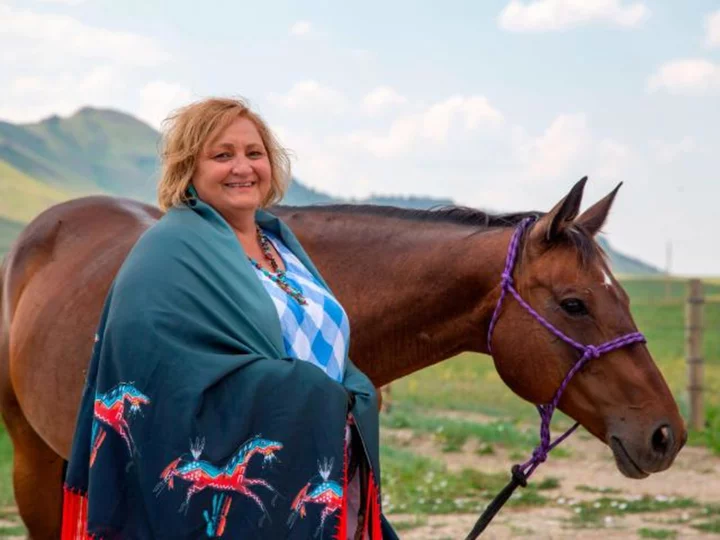When Tescha Hawley received her breast cancer diagnosis at age 46, she was raising two young children on her own and working full time for the federal government.
She and her family lived on the Fort Belknap Reservation in Montana where she grew up. The lifesaving treatment she needed several times a month was at a hospital more than 200 miles away -- a three-hour drive.
Hawley, a member of the Gros Ventre tribe, has two master's degrees, one in social work and the other in health administration. Yet the challenges she had to navigate to receive the care she needed were daunting.
"You get caught up in the emotions and are not thinking logically," Hawley said. "The only thing that I could think of was, "Am I going to die?"
Native Americans in the United States have the lowest life expectancy and the highest rate of death in many categories of preventable illness.
"As American Indian people, we represent the highest (rates) of everything -- diabetes, heart disease, cancer -- and we receive the poorest health care," Hawley said.
After her experience, Hawley was inspired to help other cancer patients and their families living on the reservation. She founded the Day Eagle Hope Project in 2017, and her nonprofit has since expanded to address many other needs of Native Americans in her community.
Navigating hurdles for lifesaving cancer care
The Indian Health Service (IHS), an agency within the Department of Health and Human Services, is tasked with providing federal health services to American Indians and Alaska Natives. But Hawley says the agency is underfunded, services are inconsistent, and equipment can be dated.
In Hawley's case, she says she experienced delays in treatment while dealing with a complicated system of healthcare providers, insurance, and approvals. She also had to drive more than 400 miles roundtrip to and from Billings, Montana, for chemo and radiation treatment that she spent a year receiving.
"The cost of hotel, food, and gas is huge, and it's a financial burden for everybody," Hawley said. "We've seen the wind chills get below 50-below, and we had 10-foot drifts in some areas. For me, a few times after receiving treatment, we would get halfway home and have to turn around because it was blizzard conditions."
As a single mother, Hawley ultimately took leave without pay to complete her treatment. She says she had $250 dollars in her checking account when she finished treatment and was grateful to family and friends who supported her through the process. She knew others on her reservation battling cancer who didn't have that kind of support.
"I had been in remission for two months and I pulled out my computer and that's when Day Eagle Hope Project was started," said Hawley, whose daughter was 9 at the time. "Her Cree name in English translates to Day Eagle Woman. This was formed in honor of her and all of our young women, so they will be strong and help our people in a good way."
In the beginning, Hawley's family loaned their time and vehicles for transportation. Hawley and her aunt drove cancer patients to and from treatment, and Hawley provided gift cards for gas, food, and hotels for those in need on her reservation, where many live below the poverty level and lack transportation and cell phone service. She also offered support workshops to connect anyone with medical hardships to available services.
"Cancer affects every one of us," she said. "Cancer affects your mental health, it affects your spiritual well-being, it affects your entire family. We take great pride in being able to help everybody, not just tribal people, but also non-Indian people."
Sustaining families, lifting spirits
As she focused on patient navigation, Hawley says she saw a need to address food insecurity as well. Residents in her community are living in a food desert and access to fresh and healthy food is scarce.
"We have so many grandparents raising grandchildren, and many generations of families are living in one household unit. It's not uncommon for three and four families to be residing in one dwelling," Hawley said.
Hawley began doing fresh food deliveries, acquiring organic foods from local farmers to distribute across the reservation, which encompasses 650,000 acres of the plains and grasslands of north-central Montana.
In addition to lean organic beef and fruits and vegetables, she's also incorporated a program to provide fresh buffalo meat to the community. Done in a culturally respectful way, veterans are given the honor of harvesting the buffalo.
"Our ancestors prayed that our buffalo would sustain us. And that's exactly what's happening today with our non-profit work," Hawley said. "We've joined in collaboration with our tribe to give back to our community."
After each harvest, thousands of pounds of organic, lean meat are distributed to communities across the reservation, feeding hundreds of families who are often struggling.
Hawley also runs programs to address crisis and chemical addiction and offers equine therapy to at-risk youth as a suicide prevention effort. In the winter, with temperatures dipping into the negative 50's with wind chill, Hawley brings firewood to Native elders.
Hawley estimates she's helped about 3,000 people not only on her reservation but from neighboring tribes as well.
"Prior to my diagnosis of cancer, I thought my life was based on my professional career and my education," Hawley said. "I still strongly believe education is our key out of poverty, but now I know that this is my calling."
Want to get involved? Check out the Day Eagle Hope Project website and see how to help
To donate to the Day Eagle Hope Project via GoFundMe, click here

